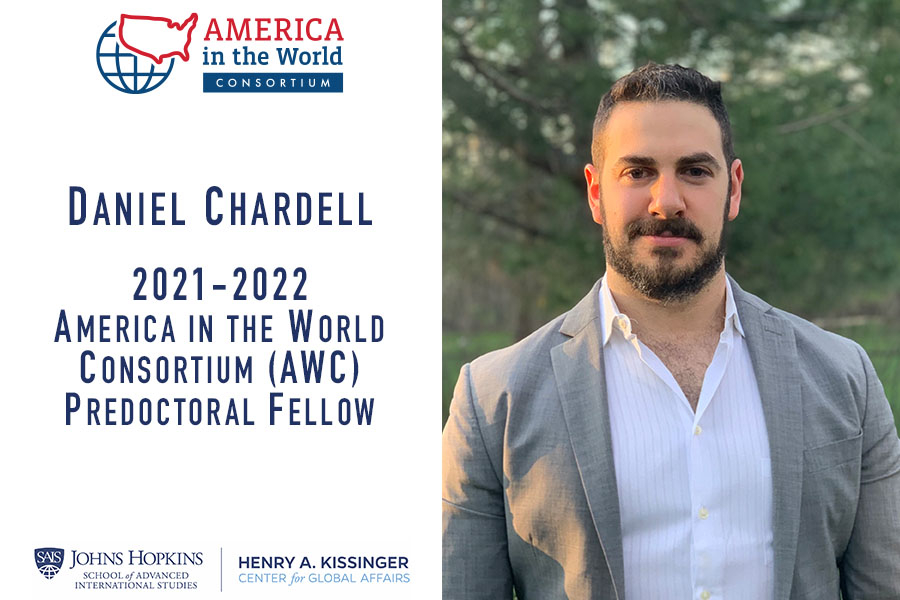Featured Scholar: Daniel Chardell, 2021-2022 AWC Predoctoral Fellow

In this Featured Scholar article, the Henry A. Kissinger Center for Global Affairs spoke with Mr. Daniel Chardell, a 2021–2022 America in the World Consortium Predoctoral Fellow at the Center, to learn more about his ongoing work on perspectives on the post-Cold War order in the Middle East.
Daniel Chardell is an America in the World Consortium Predoctoral Fellow. He is a Ph.D. candidate in the History Department at Harvard University, where his research focuses on twentieth-century U.S. foreign relations, the Middle East, and the Cold War. Drawing on U.S. archives and Arabic-language materials, his dissertation uses the Gulf War of 1991 as a lens through which to explore contending American and Arab visions of post-Cold War Middle Eastern order. Alongside his studies, he worked as a research assistant at Harvard Kennedy School’s Belfer Center. Prior to Harvard, he was a research associate at the Council on Foreign Relations. He holds a BA in history from the University of Michigan.
What would the post-Cold War era look like in the Middle East, and according to whose perspective? Mr. Daniel Chardell, a 2021–2022 America in the World Consortium Predoctoral Fellow at the Henry A. Kissinger Center for Global Affairs and current doctoral candidate in History at Harvard University is taking a multilingual approach to investigating this question.
As an undergraduate at the University of Michigan, Mr. Chardell developed a keen interest in politics and international relations during his studies of history, focusing predominantly on the Cold War in the Third World, particularly the Middle East. His love of languages was strongly encouraged, as historians he encountered emphasized multilingual research. Following internships at the Department of State and the Wilson Center, Mr. Chardell worked for three years at the Council on Foreign Relations in Washington, DC, where he published numerous articles, before beginning his Ph.D. in History at Harvard University. Mr. Chardell’s interest in contributing to the public domain’s historical awareness and understanding drew him to the Kissinger Center, which applies rigorous historical analysis to some of the world’s major issues.
In his research on the Persian Gulf War of 1991 and its immediate aftermath, Mr. Chardell uncovers the internal decision-making under Saddam Hussein’s Baathist Iraq. As a historian, Mr. Chardell is motivated by the ways in which integrating different perspectives beyond those of the United States can enrich our historical understanding. “I really believe in research in different languages,” says Mr. Chardell, who has studied Arabic and Hebrew (as well as Russian and Spanish and plans to study French). In his research, he has examined not only American materials, interviews, archives, but also Iraqi materials, Arabic language memoirs and newspapers from across the Middle East, and Iraqi government documents now available following the 2003 Iraq War.
In his dissertation, which he plans to transform into a book, Mr. Chardell seeks to investigate the “contending U.S. and Arab visions of what a post-Cold War Arab world would look like,” noting that the predominant narrative has framed the Persian Gulf War in terms of the subsequent 2003 Iraq War. However, Mr. Chardell encourages us to “look at [the Persian Gulf War] in its own historical context,” namely, the end of the Cold War. “For the U.S., but also for Iraq and others across Arab world, the end of the Cold War really shaped interpretations of what was happening in the Middle East,” he says. “The decline of [the Soviet Union] was widely understood to mean a new world order in the making,” he says. Mr. Chardell notes that many were not sure what it would look like, and his research explores the different perspectives and aspirations at the time. Mr. Chardell is also examining the relationship of the First Persian Gulf War with the Israeli-Palestinian peace process. “[T]he peace process became inextricable from preparations for war against Iraq,” he says, noting both the relevance of the issue to the United States as it sought to build a coalition in the Middle East against Iraq and as questions about Kuwait’s statehood gave rise to questions about the relationship between Israel and the West Bank and Gaza.
In addition to this project, Mr. Chardell plans to work on a second project exploring the history and causes of anti-American sentiment, and the ways in which policy can impact the image of the United States in the world. In his research, Mr. Chardell identifies a “paradox” in which people may “support its principles [and] consume its culture,” but also harbor contempt for the United States. Central to his research is “understanding foreign perspectives of U.S.,” as he examines the different bases for this sentiment in Latin America, Europe, and the Middle East.